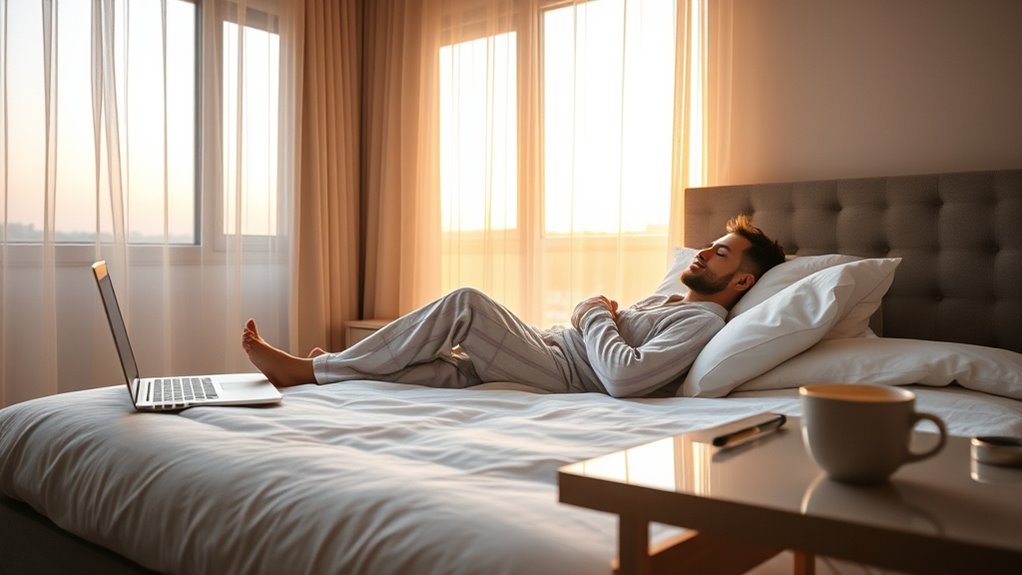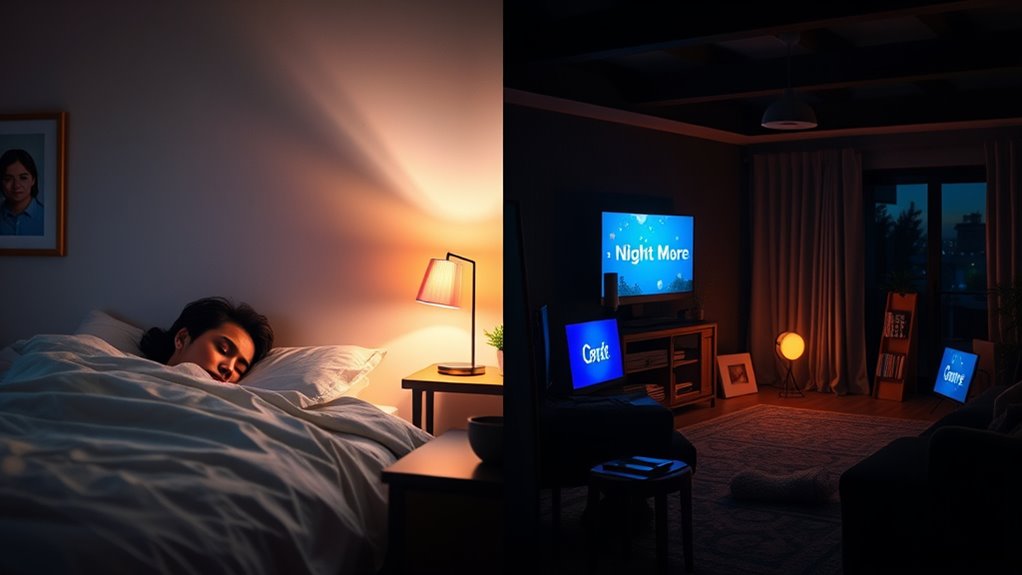Your natural sleep and productivity patterns are shaped by your internal chronotype, making you either a morning lark or a night owl. Morning larks wake early and feel most alert in the morning, while night owls thrive later in the day and into the evening. Recognizing your tendencies helps you schedule demanding tasks when you’re at your best. To uncover more about your chronotype and optimize your routine, keep exploring the details ahead.
Key Takeaways
- Your natural sleep-wake preferences, or chronotype, determine whether you’re more alert in the morning or at night.
- Morning larks wake early and peak in productivity during early hours, while night owls feel most active after sunset.
- Identifying your chronotype helps tailor your daily schedule for optimal focus and energy.
- Forcing routines against your natural tendencies can cause fatigue and reduce overall well-being.
- Recognizing if you’re a morning lark or night owl allows you to align tasks with your biological rhythm for better performance.

Have you ever wondered why you feel more energetic in the early morning or late at night? Your body’s natural rhythms, known as your sleep pattern, play a significant role in determining when you feel most alert and productive. Some people naturally wake up with the sunrise, feeling ready to tackle the day, while others find their stride when the stars come out. Recognizing your unique sleep pattern can help you optimize your daily schedule and boost your overall productivity peaks.
Your sleep pattern is influenced by your chronotype — a biological predisposition that dictates your preferred times for sleeping and waking. If you’re a morning lark, you likely find yourself waking up early, feeling most alert in the morning hours, and winding down as the evening approaches. Conversely, if you’re a night owl, you might struggle to get up early but thrive during late-night hours, experiencing your productivity peaks well after sunset. Understanding your chronotype isn’t just about personal preference; it’s rooted in your internal biological clock, the circadian rhythm, which regulates sleep-wake cycles over a 24-hour period.
Once you identify your natural tendencies, you can adjust your daily routine accordingly. For instance, morning larks might schedule demanding tasks or meetings in the early hours when their energy levels are highest. Night owls, on the other hand, should consider reserving their most challenging work for the late afternoon or evening when they feel most alert. Trying to force yourself into a schedule that conflicts with your sleep pattern can lead to fatigue, reduced focus, and decreased productivity. Instead, aligning your work and activities with your natural rhythm allows you to reach your productivity peaks more consistently.
Additionally, paying attention to your sleep pattern can improve your overall well-being. When you honor your internal clock, you tend to sleep better, feel less stressed, and maintain higher levels of motivation. If you’re a night owl, forcing yourself into an early wake-up time might cause sleep deprivation, which hampers your cognitive function and creativity. Conversely, early risers who stay up late might feel out of sync if they try to push back their bedtime. By respecting your natural tendencies, you ensure that your sleep quality remains high, giving you more energy during your most productive times.
Furthermore, understanding your chronotype can help you make informed decisions about work-life balance and social activities, leading to a more satisfying lifestyle. When you recognize whether you’re a morning lark or night owl, you can better plan your commitments around your natural biological predispositions, enhancing both your efficiency and happiness.
In essence, understanding your sleep pattern and productivity peaks isn’t about fitting into a societal mold; it’s about working smarter. When you tailor your schedule to your chronotype, you harness your body’s natural rhythm, making it easier to stay focused, motivated, and efficient throughout the day. Recognizing whether you’re a morning lark or night owl helps you optimize your routine, leading to a more balanced, fulfilling life.

Vivilumens Sunrise Alarm Clock for Heavy Sleepers Adults, Wake-up Light, Sleep Aid 10 White Noise Sound Machines with 30/60/90 Timer, 3 Level Dimmable Touch Table Lamp with Snooze USB Charger Port
【Sunrise Simulation Alarm Clock – Wake Up Gently to Natural Light】Start your day the right way with our…
As an affiliate, we earn on qualifying purchases.
As an affiliate, we earn on qualifying purchases.
Frequently Asked Questions
Can Chronotypes Change Over a Lifetime?
Yes, your chronotype can change over your lifetime. Genetic influences play a role, but social factors like work schedules, lifestyle, and age also impact your sleep preferences. As you age, you might shift from being a night owl to a morning lark or vice versa. These changes happen naturally and can be influenced by your environment, health, and habits, making your chronotype flexible over time.
How Do I Determine My Exact Chronotype?
Think of your sleep patterns as your personal GPS, guiding you to your biological clock. To determine your exact chronotype, track when you naturally feel most alert and sleepy over a week. Note your wake-up and bedtime, and observe when you hit your peak energy. This self-monitoring helps identify if you’re a morning lark, night owl, or somewhere in between, aligning your routine with your body’s internal timing.
Are There Health Risks Linked to Being a Night Owl?
Being a night owl can pose health risks, especially if your sleep quality suffers or if it disrupts your mental health. Staying up late often leads to insufficient sleep and social jet lag, which may increase anxiety or depression. To protect your well-being, prioritize consistent sleep habits and guarantee you get enough rest, regardless of your natural tendencies. Recognizing these risks helps you make healthier choices for your lifestyle.
Can Altering My Schedule Shift My Chronotype?
Yes, changing your sleep habits can gradually shift your chronotype. If you consistently go to bed and wake up earlier or later, you may reduce social jetlag and influence your body’s natural rhythm. However, it takes time and consistency to see lasting effects. Be patient, prioritize good sleep hygiene, and gradually adjust your schedule to minimize disruption and support your body’s internal clock.
Do Chronotypes Affect Academic or Work Performance?
Think of your sleep patterns as the rhythm of a finely tuned orchestra. Your chronotype influences your circadian rhythm, affecting when you’re most alert and focused. If your schedule aligns with this natural tempo, your academic and work performance improves. Conversely, mismatched routines can cause discord, leading to fatigue and decreased productivity. Understanding your chronotype helps you optimize your schedule, allowing your natural rhythm to drive success.

livho Gaming Blue Light Blocking Glasses for Better Sleep, Premium Night Driving, Computer Blockers for Man & Woman
REDUCE EYE STRAIN: These glasses for computer eye strain limit your blue-light exposure and alleviate eye strain, headaches,…
As an affiliate, we earn on qualifying purchases.
As an affiliate, we earn on qualifying purchases.
Conclusion
So, whether you’re a bright-eyed morning lark or a sneaky night owl, it turns out your body’s just doing its own thing. Ironically, the very traits that make you feel in sync or out of step might not matter as much as you think—your natural rhythm is just wired that way. So, embrace your chronotype, even if it means staying up late or waking early. After all, who’s really winning the race?

Fitbit Inspire 3 Health &-Fitness-Tracker with Stress Management, Workout Intensity, Sleep Tracking, 24/7 Heart Rate and more, Midnight Zen/Black One Size (S & L Bands Included)
Inspire 3 is the tracker that helps you find your energy, do what you love and feel your…
As an affiliate, we earn on qualifying purchases.
As an affiliate, we earn on qualifying purchases.

Intelligent Change – 3-Month Productivity Planner, Productivity Tools for Time-Management and Mindfulness, Daily To-Do List, A5 Undated Quarterly Planner, Beige (Beige)
Helps Boost Your Productivity – Nothing beats the satisfaction of staying on top of your daily tasks and…
As an affiliate, we earn on qualifying purchases.
As an affiliate, we earn on qualifying purchases.








